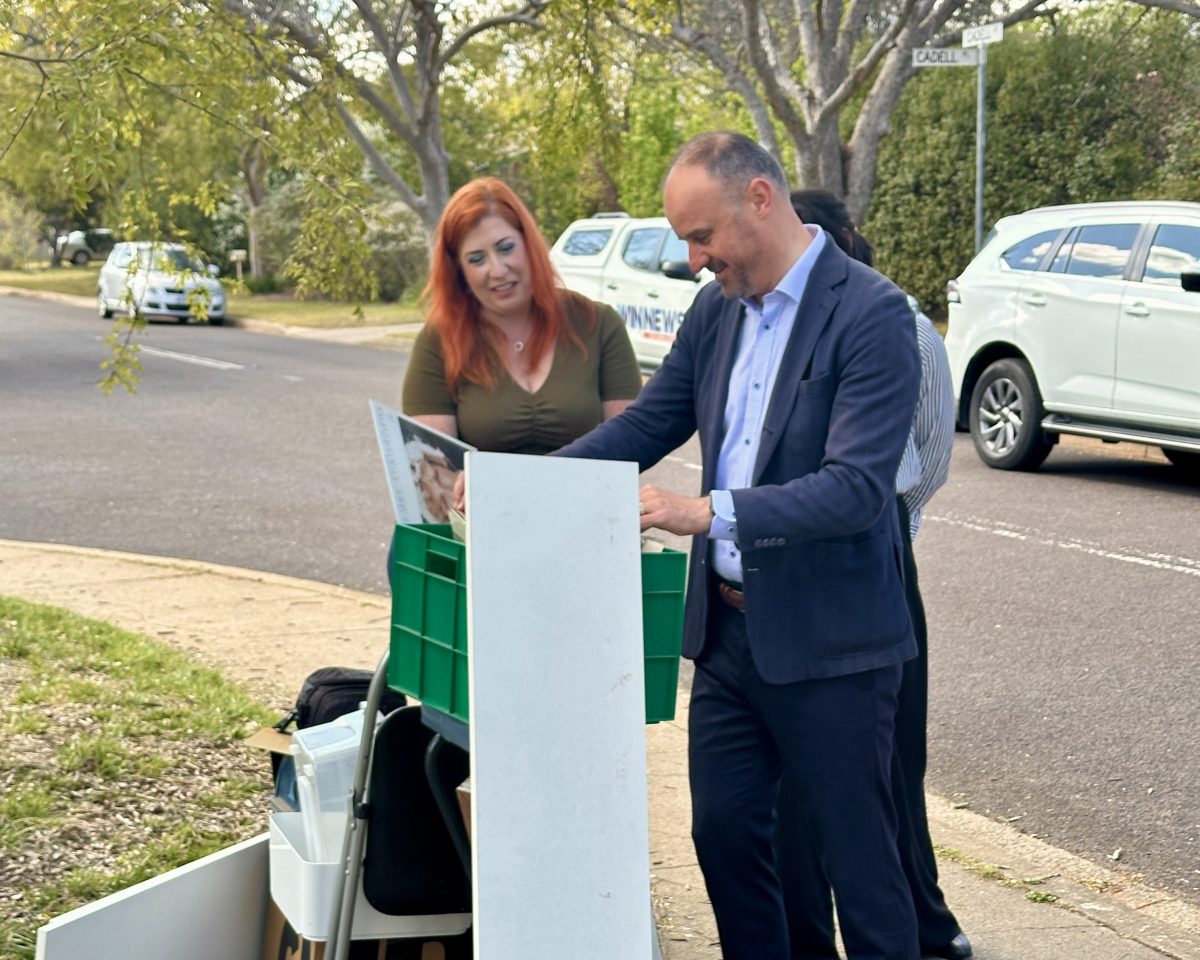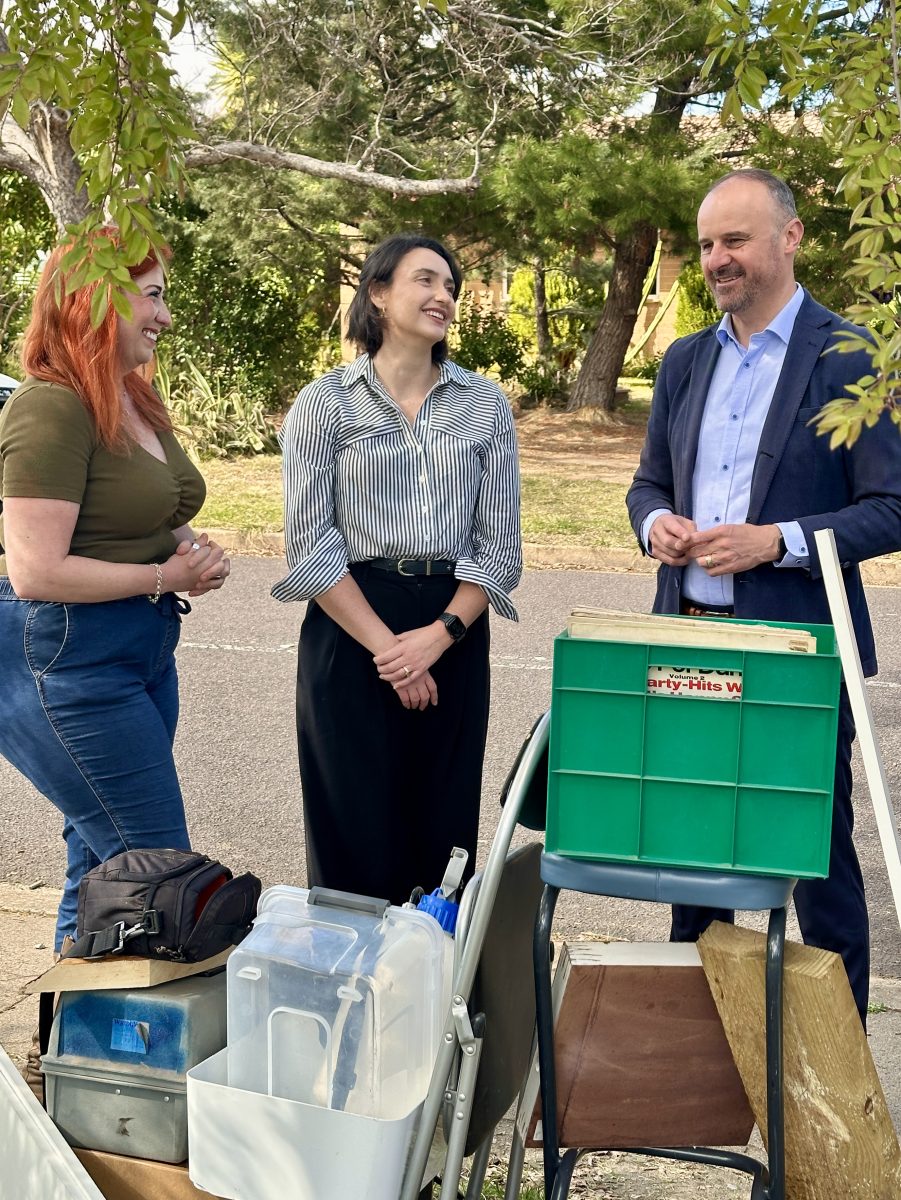
Labor has promised to trial a new kerbside bulky-waste collection program in 20 suburbs across Canberra’s north and south. Photo: ACT Labor.
“Nothing’s more frustrating” for Canberra’s teams of lawnmowers than coming across a soggy mattress abandoned in the long grass, according to ACT Minister for City Services Tara Cheyne.
“It’s a real diversion of resources,” she says.
“The crews have to collect the mattress, they have to take it to the tip, and that all has to happen before they can get started on their jobs. It’s enormously frustrating.
“But I also appreciate that if people are going to those lengths to dump something like that, it signals a greater issue across our community.”
Weeks out from the election, ACT Labor has promised a solution to this, and it’s called ‘Second-hand Sundays’.
The party promises to trial a new kerbside bulky-waste collection program in 20 suburbs across Canberra’s north and south.
Residents will be able to place unwanted items on the nature strips outside their homes on a designated Sunday, and between then and when the government’s crews come along to collect them on the Monday, passers-by are invited to pick through and take what they want.
At the moment, the government allows each household one collection per financial year of up to two cubic metres of bulky items too big for your kerbside bins, such as old furniture and broken appliances.
Residents book it up to six months in advance through the ACT Government website and place the items out (in an “easily accessible spot” within your property boundary) no more than 48 hours in advance of the collection date and no later than 7 am on the day.
But if you live in an apartment or townhouse with shared waste, you have to contact your body corporate or building manager to make a booking on your behalf, and that’s the first problem, according to Ms Cheyne.
“What we know is that there is a challenge currently with the bookable bulky waste collection service for some of our larger apartments that might not necessarily have the engagement of the strata managers or a dedicated space to be able to put things,” she said.
“But if they’re able to have one day of being able to spread it out on a curb and know that it’s collected by the Monday or Tuesday, that might really suit them.”
She also said it would encourage more people to reuse and recycle.
“Different to other jurisdictions, which discourage the idea of scavenging through other people’s goods that are put on the curbside, we actually want people to be able to see what’s there, and what’s close to their home that they might be able to use or perhaps repair,” she said.
“We want to … draw on what we see at Goodies Junction, where people are donating all sorts of wonderful goods that, with a little bit of TLC, can then be repurposed, reused and to have a second lease on life.”
Even when they do get into government hands, not all of the items collected through the bulky waste service go into landfill either.
“Where possible, items will be reused or recycled,” the government says on the City Services website.
Labor hasn’t named the suburbs, except they’ll contain a “diverse range” from the north and south. The expansion will also be built into a new contract with waste collection company JJ Richards and Sons, coming into effect from April 2025.
Ms Cheyne is “quietly confident” they’ll be able to expand it to the rest of Canberra, but only once they’ve seen some “positive impacts”.
“We’d be looking for a reduction in illegal dumping and taking up of goods and not having much to actually collect because of the success of Second-hand Sundays.”

City Services Minister Tara Cheyne, Downer resident Erin Priestly and Chief Minister Andrew Barr. Photo: ACT Labor.
The program will also be accompanied by a crackdown on illegal dumping as the government will have “a range of options for people to be taking up”.
Erin Priestly, a Downer mum, is already keen.
Her “very young family” is in that season of life where items are really only needed for six to 12 months. She said, “It would be wonderful to be able to leave those items out for my neighbours and the rest of the suburb to go through and choose what they might need, and also for me to be able to go through their items for that next stage of our lives as well”.
There are several existing ‘Buy Nothing’ groups in Canberra that work in a similar fashion, but Erin says it will be easier to “travel around your own suburb on foot”.













